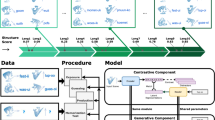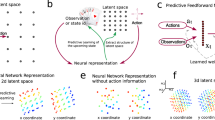Abstract
We present a framework for studying the biases that recurrent neural networks bring to language processing tasks. A semantic concept represented by a point in Euclidean space is translated into a symbol sequence by an encoder network. This sequence is then presented to a decoder network which attempts to translate it back to the original concept. We show how a pair of recurrent networks acting as encoder and decoder can develop their own symbolic language that is serially transmitted between them either forwards or backwards. The encoder and decoder bring different constraints to the task, and these early results indicate that the conflicting nature of these constraints may be reflected in the language that ultimately emerges, providing clues to the structure of human languages.
We thank Tony Plate and Elizabeth Sklar for helpful discussions. The research was supported by an APA to BT, a UQ Postdoctoral Fellowship to AB and an ARC grant to JW.
Preview
Unable to display preview. Download preview PDF.
Similar content being viewed by others
References
Noam Chomsky. On certain formal properties of grammars. Information and Control, 2(2):113–124, 1959.
M. H. Christiansen and N. Chater. Toward a connectionist model of recursion in human linguistic performance. To appear: Cognitive Science, 1998.
J. Elman. Distributed representations, simple recurrent networks and grammatical structure. Machine Learning, 7:195–224, 1991.
J. Elman. Learning and development in neural networks: The importance of starting small. Cognition, 48:71–99, 1993.
M. Hare and J. Elman. Learning and morphological change. Cognition, 56:61–98, 1995.
S. Kirby. Fitness and the selective adaptation of language. In James Hurford, Chris Knight, and Michael Studdert-Kennedy, editors, Approaches to the Evolution of Language: Social and Cognitive Bases for the Emergence of Phonology and Syntax. Cambridge University Press, 1998.
S. Lawrence, C. L. Giles, and S. Fong. Natural language grammatical inference with recurrent neural networks. To appear: IEEE Transactions on Knowledge and Data Engineering, 1998.
C. Moore. Dynamical recognizers: Real-time language recognition by analog computers. Theoretical Computer Science, 201(1-2):99–136, 1998.
A. M. Turing. On computable numbers, with an application to entscheidungsproblem. Proceedings of the London Mathematical Society, Series 2, 42:230–265, 1936.
J. Weckerly and J. Elman. A PDP approach to processing center-embedded sentences. In Proceedings of the Fourteenth Annual Conference of the Cognitive Science Society, Hillsdale, NJ, 1992. Erlbaum.
Author information
Authors and Affiliations
Editor information
Editors and Affiliations
Rights and permissions
Copyright information
© 1999 Springer-Verlag Berlin Heidelberg
About this paper
Cite this paper
Tonkes, B., Blair, A., Wiles, J. (1999). A Paradox of Neural Encoders and Decoders or Why Don’t We Talk Backwards?. In: McKay, B., Yao, X., Newton, C.S., Kim, JH., Furuhashi, T. (eds) Simulated Evolution and Learning. SEAL 1998. Lecture Notes in Computer Science(), vol 1585. Springer, Berlin, Heidelberg. https://doi.org/10.1007/3-540-48873-1_46
Download citation
DOI: https://doi.org/10.1007/3-540-48873-1_46
Published:
Publisher Name: Springer, Berlin, Heidelberg
Print ISBN: 978-3-540-65907-5
Online ISBN: 978-3-540-48873-6
eBook Packages: Springer Book Archive




